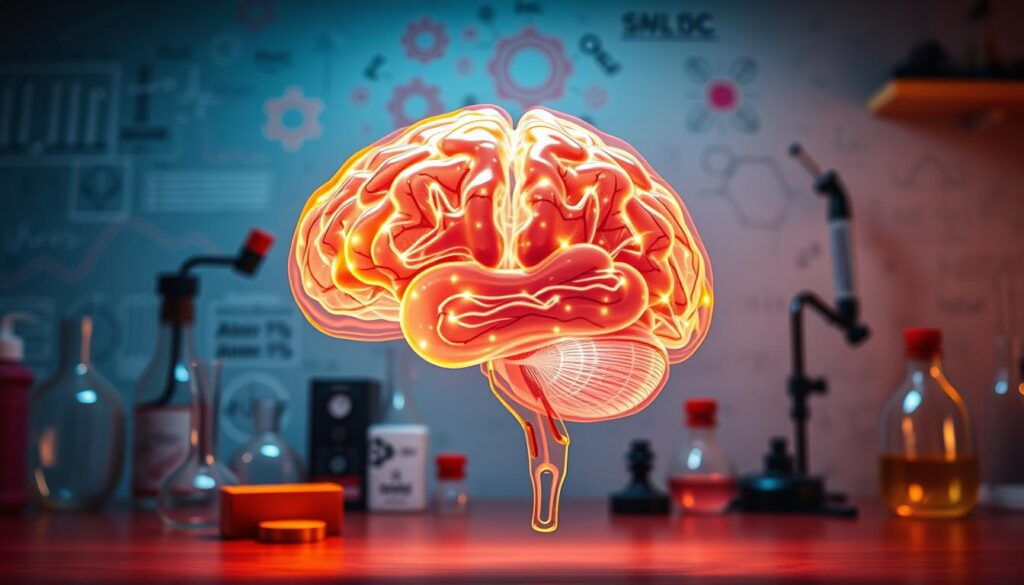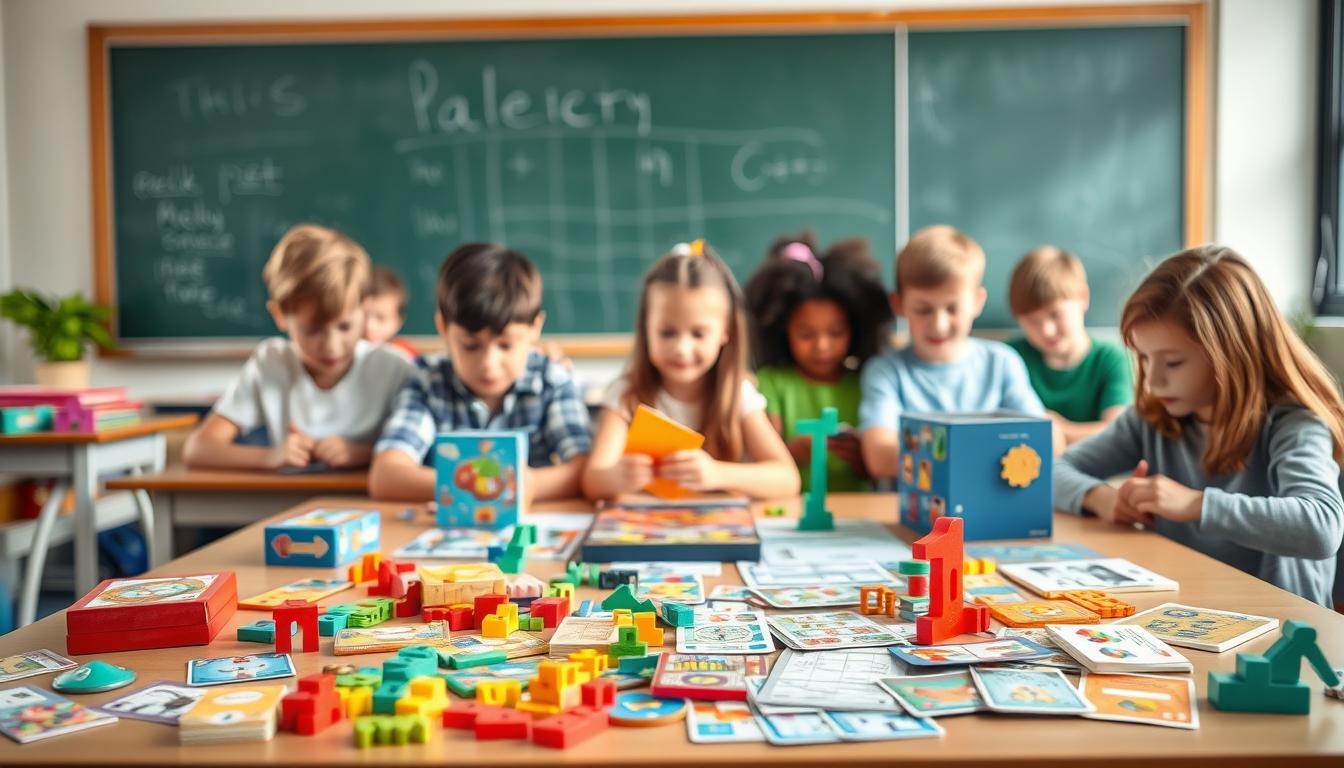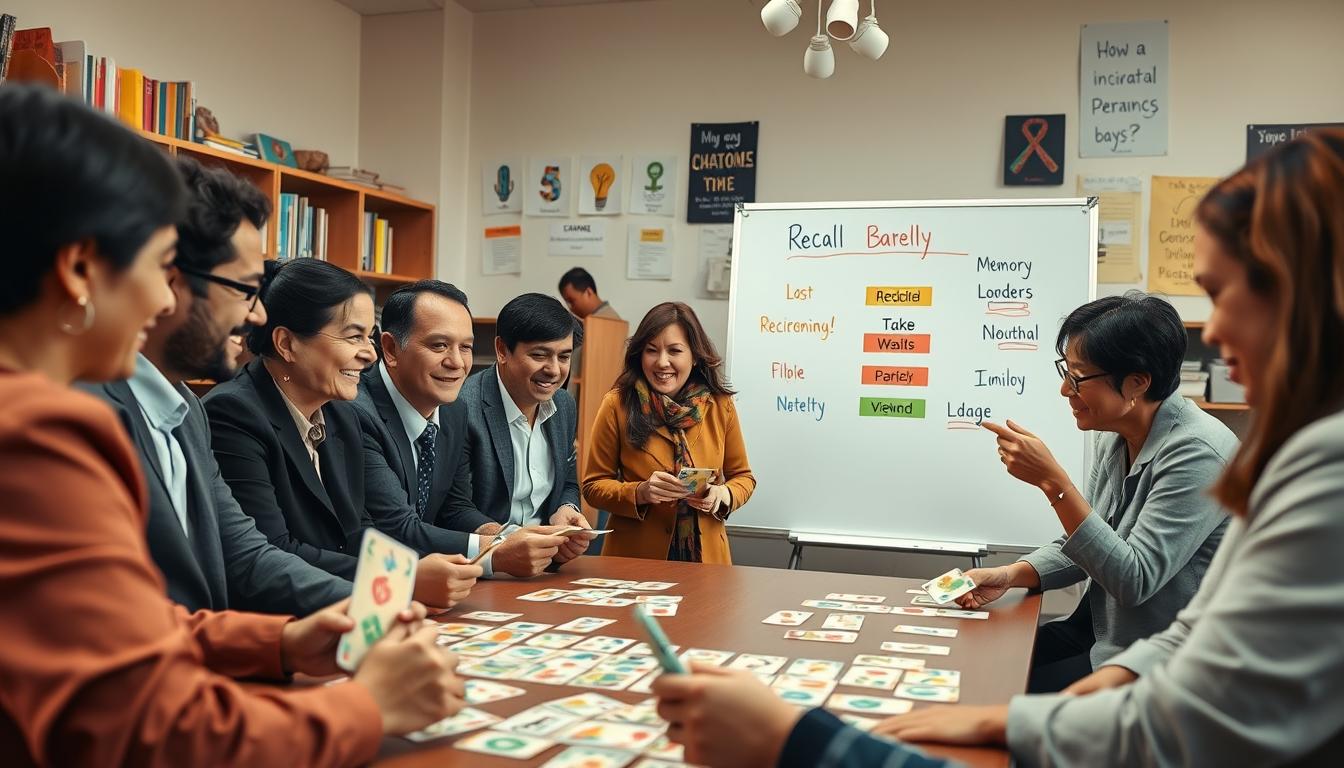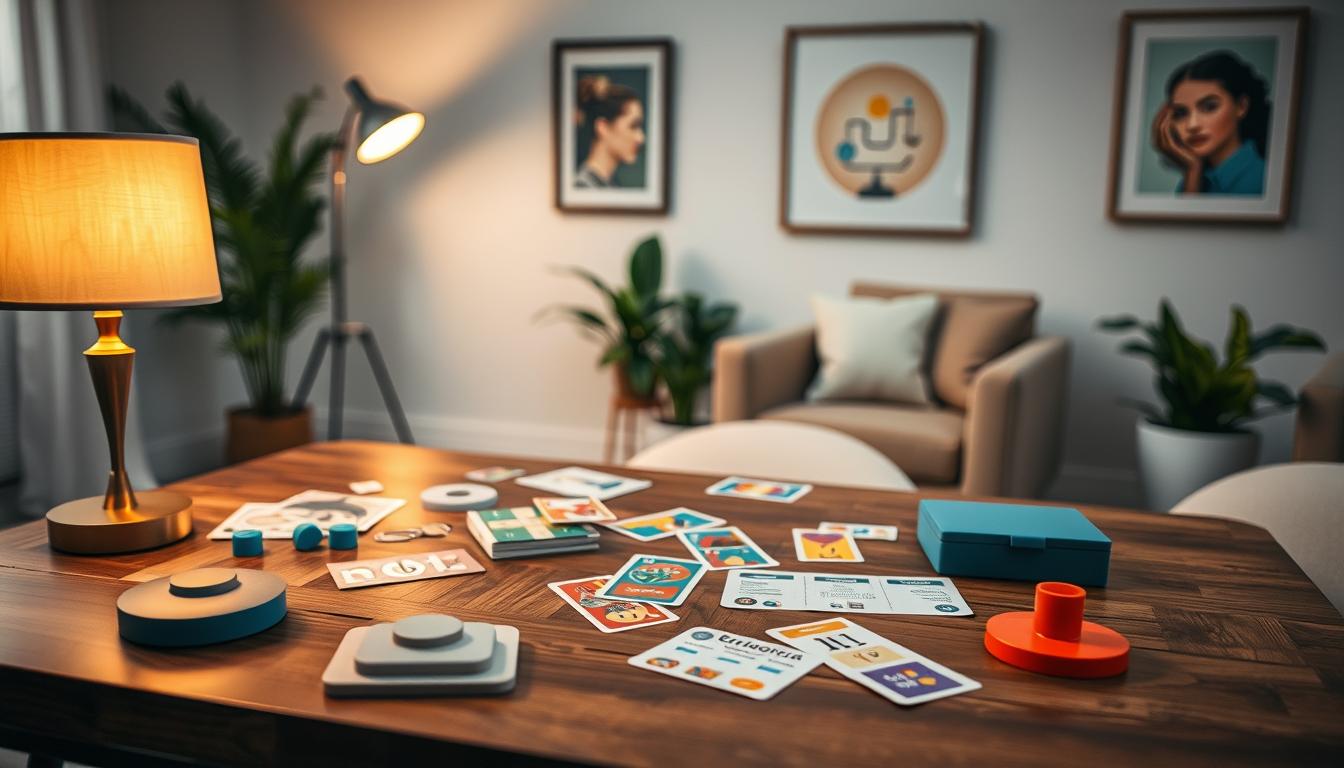Educational games that train the brain in short daily sessions
Ever thought about how a few minutes a day could boost your brain? In our busy lives, it’s hard to find time for mental workouts. But, educational brain games are made for short, daily sessions that fit right in.
These games improve skills like memory and problem-solving. Plus, they make learning fun and effective.
Importance of Brain Training
Brain training is key to keeping our minds sharp. It helps us remember better and think faster. Doing brain exercises regularly makes our lives richer and more efficient.
Benefits for Cognitive Health
Brain training does more than just improve memory. It builds new brain connections, making us more focused and creative. This boosts our performance in work and personal life.
Effects on Aging and Cognitive Decline
As we age, our brains can slow down. But, studies show that brain games can slow this down by almost 10 years. Playing puzzles and memory games keeps our minds agile as we get older.

Understanding the Science Behind Brain Games
Brain games work by making our brains work harder. They challenge us in different ways, improving our focus, memory, and thinking skills. Studies show that playing these games regularly can make us better learners.
Cognitive Function and Learning
Brain games help us improve our thinking by tackling different mental challenges. They make us think fast and solve problems well. This boosts our mental sharpness.
Research Findings on Brain Training Effectiveness
Many studies have shown that brain games can really help. For example, Lumosity found that people who played their games got much better at thinking tests. This shows that playing brain games can make our brains stronger.

Types of Educational Games Available
There are many brain games out there, each designed to boost different skills. Puzzles and word games help with thinking and language. Memory and attention games sharpen recall and focus. These games are fun and great for learning.
Puzzles and Word Games
Puzzles like Sudoku and crosswords are great for the brain. They make you think strategically and solve problems in new ways. Word games like Scrabble and Boggle test your quick thinking and vocabulary. Playing these games can make you better at solving problems and have fun while doing it.
Memory and Attention Exercises
Memory games are key to keeping your mind sharp. They include matching cards or remembering sequences. Apps now offer memory training that improves attention and flexibility. Regularly playing these games can make you more focused and mentally sharp.
| Type of Game | Skill Developed | Examples |
|---|---|---|
| Puzzles | Problem-solving, analytical thinking | Sudoku, crosswords |
| Word Games | Vocabulary, linguistic skills | Scrabble, Boggle |
| Memory Games | Memory retention, focus | Memory matching, card games |
| Attention Exercises | Concentration, mental agility | Apps with tailored exercises |
Brain Games for Quick Daily Training
Adding brain training games to your daily routine can boost your thinking skills. These games are easy to use and give instant feedback. They’re perfect for busy days, offering quick mental workouts.
Features of Effective Brain Training Games
Good brain training games have a few key traits:
- User-Friendly Design: They’re easy to navigate, so you can start playing right away.
- Adaptive Difficulty: They adjust to your skill level, keeping you interested.
- Immediate Feedback: You get results fast, helping you see how you’re doing.
- Variety of Activities: They offer different games, keeping things fresh and fun.
Examples of Popular Applications
Many brain training apps are popular for good reasons. Here are a few:
| App Name | Main Features | Focus Areas |
|---|---|---|
| Lumosity | Diverse games, personalized training, performance tracking | Memory, attention, problem-solving skills |
| CogniFit | Variety of brain games, progress reports, brain assessments | Processing speed, executive functions, memory improvement |
| Peak | Daily workouts, brain challenges, social features | Emotional control, language skills, focus |
These apps let you see how you’re improving. Regular use helps you stay on track, improving your brain over time.
Daily Sessions: Short Yet Impactful
Creating good brain training schedules can really boost your mental sharpness. It doesn’t have to be hard, especially if you’re busy. Just 15 to 20 minutes a day can make a big difference.
It’s all about making it a part of your daily life. This way, you can keep up with brain exercises without feeling overwhelmed. It’s a small step that can lead to big changes.
Time Management for Busy Lifestyles
Adding brain training to your day needs smart time planning. You can do short sessions during work breaks, while commuting, or when you have a spare moment at home. Setting reminders or scheduling specific times helps you stick to it.
It’s about finding those small windows in your busy day. This way, you can stay focused and keep up the motivation.
Consistency and Habit Formation
Short sessions add up over time, showing the power of regular practice. Spending a few minutes each day on brain exercises builds a strong habit. This habit boosts your memory and focus.
It also helps keep your brain healthy for the long term. Regular practice strengthens your brain’s connections, making it more agile.
Gamification in Learning and Brain Training
Gamification in education changes how we learn by adding game-like elements. It makes learning fun and engaging. By using challenges, rewards, and levels, it creates an interactive space that keeps users interested.
This approach not only entertains but also improves our thinking skills. It does this by making us participate in activities that challenge our brains.
Enhancing Engagement Through Game Mechanics
Adding game mechanics to educational tools makes learning better. Features like points, badges, and leaderboards create a sense of competition. This encourages users to keep getting better.
This increased engagement in brain training leads to better thinking skills over time. Gamification makes learning fun, helping us discover and remember more.
The Role of Feedback and Progress Tracking
Feedback and progress tracking are key to making gamified learning work. They help us see how we’re doing and what we need to work on. Custom feedback lets us tailor our learning to fit our needs.
This feedback motivates us to do better and helps us remember what we’ve learned. It’s a powerful way to keep improving and growing.
Benefits of Playing Educational Games
Playing educational games has many benefits beyond just fun. They help improve memory and boost cognitive skills. These games make our brains more agile and skilled.
Improvement in Memory and Focus
One big plus of educational games is how they enhance memory. Playing them regularly can make you better at remembering things. It also helps you stay focused for longer, which is great in today’s busy world.
Skills Enhancement Across Multiple Domains
Educational games also help improve many cognitive skills. They can make you better at solving problems, understanding language, and even spatial skills. These improvements can make you more well-rounded and help you succeed in school and work.
| Skills Developed | Description | Impact on Daily Life |
|---|---|---|
| Memory Improvement | Enhancement of recall and retention abilities. | Better performance in academic and work-related tasks. |
| Cognitive Skills | Boosts in problem-solving and critical thinking. | Improved decision-making and adaptability in real-life scenarios. |
| Focus and Concentration | Increases ability to concentrate over longer durations. | Greater productivity in both personal and professional activities. |
How to Choose the Right Game for You
Choosing brain games is a careful process. It should match your personal needs and goals. First, figure out what you want to improve, like memory or problem-solving skills. This helps you pick games that really help you.
Identifying Your Cognitive Goals
Knowing your cognitive goals helps you pick the right games. This targeted approach makes your training more effective. For example, if you want to improve memory, choose games that challenge your recall.
Setting clear goals keeps you motivated and on track. It helps you stay focused on what you want to achieve.
Assessment of Personal Preferences and Needs
Your personal preferences and gaming style are key. Think about what games you enjoy and find interesting. Playing games you like makes it easier to stay motivated and consistent.
Also, consider how much time you have and where you like to play. This helps you find games that fit your lifestyle and preferences.
Integrating Brain Games Into Daily Routine
Adding brain games to your daily life boosts your mental health. By setting aside specific times for gaming, it becomes a regular part of your day. Playing brain games regularly sharpens your mind and gives you a sense of achievement.
Strategies for Consistent Play
To make brain games a part of your daily routine, try these tips:
- Choose a specific time each day, like during breakfast or before bed.
- Use reminders or apps to remind you when it’s time to play.
- Play in short sessions of 10-15 minutes to keep it fun and focused.
- Keep track of your progress to see how you’re improving.
Combining With Physical and Mental Wellness Activities
Combining mental games with physical exercise and mindfulness is key. Exercise, like walking or yoga, boosts blood flow to the brain. This helps your brain work better. Mindfulness meditation also helps by reducing stress and improving focus during games.
This mix of activities creates a well-rounded routine that supports your brain health.
Cross-Training Your Brain
Trying different learning activities is key to cross-training your brain. Games offer a great way to work on various brain skills. Playing a mix of games helps keep your mind sharp and healthy.
Variety in Gaming and Learning Activities
Playing different games is good for your brain. Puzzles, word games, and memory exercises are fun and brain-stimulating. They keep your mind active and stop boredom, which can slow down brain growth.
From apps to board games, there’s a wide range to choose from. This variety helps improve your mental quickness.
The Importance of Challenging Oneself
Looking for challenges is vital for brain growth. Learning new things, like a musical instrument or a language, works different brain parts. This boosts your brain’s connections, helping with memory and solving problems.
By facing new challenges, you keep your brain healthy and flexible. This is good for your brain’s health and ability to adapt.
Understanding Cognitive Domains Targeted by Games
Educational games aim to improve different parts of the brain. They focus on memory, processing speed, and executive function. Playing these games can make our daily thinking better.
Memory and Processing Speed
Games for memory and speed help the brain hold and quickly get information. Doing memory exercises improves recall and quick data processing. These skills are key for fast decision-making and managing information every day.
Executive Function and Problem Solving Skills
Executive function includes planning, organizing, and doing tasks. Games that boost problem-solving skills help us think critically and adapt. They make us better at solving problems, leading to more confidence and independence.
Success Stories: Real Impact of Educational Games
Many people who play educational games see big changes in their thinking and daily life. With each game, they notice improvements that affect their work and personal life. These stories show how brain games can really make a difference.
Users often talk about getting better at solving problems and making decisions. They say they can focus better on tasks that used to be hard. These stories encourage others to try brain games for themselves.
Testimonials from Users
Users share how these games boost their thinking skills. They feel more confident in solving problems and making decisions. Many say they can focus better on tasks that used to be hard.
These personal stories are powerful. They motivate others to add brain games to their daily routine.
Case Studies and Research Findings
Research backs up the idea that educational games improve thinking. Studies show that people who play these games get better at remembering things and processing information faster. This research supports the success stories from users, showing that brain games really work.
The Role of Technology in Brain Training
Technology has changed brain training a lot. Now, digital platforms make it easy and fun to improve your mind. Sites like Lumosity and CogniFit offer programs that fit your needs and goals.
Advantages of Digital Platforms
Digital brain games are flexible and easy to fit into your day. You can use them on many devices, so you can train anywhere, anytime. These programs give you feedback right away, which keeps you motivated to get better.
Emerging Trends in Brain Training Technologies
New trends in brain training include virtual reality and artificial intelligence. These technologies make training more engaging and effective. AI helps brain games adjust to your progress, making your training more personal and impactful.
Maintaining Brain Health Beyond Games
Keeping your brain healthy is more than just playing games. It’s about exercising, eating right, sleeping well, and managing stress. Each of these activities helps your brain work better and keeps you feeling good.
Physical Exercise and Diet Considerations
Regular exercise is key for brain health. It boosts blood flow, bringing oxygen and nutrients to brain cells. Activities like running, lifting weights, or just walking can improve your thinking skills.
Eating a balanced diet is also important. Foods like fruits, veggies, whole grains, and healthy fats are good for your brain. Foods rich in omega-3s, antioxidants, and vitamins help keep your brain sharp.
Importance of Sleep and Stress Management
Getting enough sleep is crucial. It helps your brain process information, remember things, and clean out toxins. Adults need 7-9 hours of sleep each night to stay sharp.
Managing stress is also vital. Stress can hurt your brain health. Mindfulness, meditation, or socializing can help reduce stress and keep your brain healthy.
Potential Drawbacks and Considerations
Brain games are becoming more popular, but we need to look at their limits. They have many benefits, but we must understand their downsides. Often, the real-world use of these games falls short.
Users might find that playing these games doesn’t always help in everyday life. Improvements in certain tasks don’t always translate to better performance in real situations.
Limits of Brain Games in Real-World Application
Many people think brain games will greatly improve their thinking skills. But research shows that these games might not help as much as expected. The skills gained in the game often don’t apply to real-life tasks.
The lack of real-world context and variety in games can be a problem. This makes it hard for skills to transfer to everyday activities.
Individual Differences in Effectiveness
How well brain games work can vary from person to person. People with different levels of experience and motivation may see different results. Some might notice better focus and memory, while others might not see any change.
This shows that brain games should be part of a broader approach. Combining them with other exercises can lead to better results.
Conclusion
Brain games have become a key part of cognitive training. They work best when done in short daily sessions. These games can make your mind sharper, improve memory, and boost overall brain health.
Technology is making brain training easier and more fun. With apps and online games, it’s now simpler to keep your mind sharp. This shows how important games are for keeping your brain fit for life.
Improving your brain is a personal journey. It’s filled with chances to learn and grow. By using brain games regularly, people of all ages can reach their full potential. It’s a fun way to improve your life beyond just playing games.
FAQ
What are educational games designed for brain training?
Educational games for brain training are fun and interactive. They help improve skills like memory and problem-solving. You can play them for a few minutes each day.
How can brain training impact cognitive health?
Brain training can make your mind sharper. It can help you remember things better and solve problems faster. Studies show it can slow down brain aging by 10 years in older adults.
What types of cognitive functions do brain games target?
Brain games work on many skills. They improve attention, memory, and how fast you process information. This makes your brain work better overall.
Are there specific examples of popular brain training apps?
Yes, apps like Lumosity and CogniFit are popular. They offer training programs to boost your memory and problem-solving skills. They’re designed just for you.
How much time should I dedicate to brain training each day?
Just 15 to 20 minutes a day can make a big difference. It’s easy to fit into your busy schedule.
What role does gamification play in brain training?
Gamification makes games more fun. It rewards you for your achievements and gives you feedback right away. This makes you feel good and keeps you motivated.
How do educational games improve memory and focus?
Playing games regularly helps your memory and focus. It challenges you to solve problems and improve your skills. This includes better understanding of language and spatial abilities.
How can I choose the right educational game for my needs?
First, think about what you want to improve, like memory or attention. Then, pick a game that interests you. This way, you’ll enjoy playing and keep at it.
What strategies can I use to integrate brain games into my daily routine?
Set a specific time for gaming each day. Mix it with physical activities and mindfulness exercises. This keeps your brain healthy and balanced.
What does cross-training the brain involve?
Cross-training means doing different activities to challenge your brain. This includes games and learning new skills. It keeps your brain flexible and healthy.
Can educational games have real-world benefits?
Yes, many people see real improvements in their daily lives. Research shows brain games can make you better at solving problems and remembering things.
How does technology enhance brain training effectiveness?
Digital platforms like Lumosity offer personalized games and feedback. New trends include virtual reality and AI to make games even more engaging and effective.
How can maintaining brain health be supported beyond games?
Keep your brain healthy with exercise, a balanced diet, enough sleep, and managing stress. This holistic approach supports your brain’s well-being.
What should I be aware of regarding the limitations of brain games?
Brain games are great, but they work differently for everyone. Your past experiences and motivation matter. A balanced mix of exercises is key to keeping your brain sharp.














